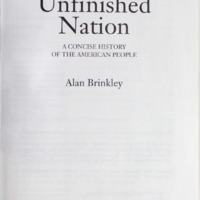-
Title
-
The unfinished nation : a concise history of the American people
-
Description
-
An historical work which details the diversity of the American people.
-
Identifier
-
446780
-
679425489
-
Creator
-
Brinkley, Alan
-
Format
-
1st ed.
-
Source
-
Brian Lamb Booknotes Collection
-
Gift of Brian Lamb, 2011.
-
Catalog record
-
Language
-
eng
-
Date
-
1993
-
Program air date: October 10, 1993.
-
Publisher
-
Knopf
-
George Mason University. Libraries. Special Collections & Archives
-
Relation
-
Original Booknotes interview
-
Rights
-
This work may be protected by copyright laws and is provided for educational and research purposes only. Any infringing use may be subject to disciplinary action and/or civil or criminal liability as provided by law. If you believe that you are the rights-holder and object to Mason’s use of this image, please contact speccoll@gmu.edu.
-
Text
-
Transcription of Annotations
Underlinings/notes: As US becomes more divers, historians revealing a more complex view of country's past. US created a mass popular culture for the American people and for the rest of the world. Book=newer story. Title--Unfinished nation--reminder of nation's diversity, centrality of change in history, continual transformation. Slavery, from white racism? Increase in slaves was response to demand for more labor. American Revolution--political/intellectual event or social/economic phenomenon? Historians of 1950s--shared political principles; 1960s revolutionary crowds likely to attack all symbols of wealth/power. Constitution--5 states sent delegates to Annapolis. 55 men attended convention--average age 44. Schlesinger--Jacksonian Democracy--control Eastern capitalist groups for benefit of non-capitalist groups, farmers, laboring men in East, West, South. Dred Scott--Missouri slave. Defeat for ant-slavery forces, affirmation of South's argument that Constitution guaranteed existence of slavery. Taney--blacks no rights. Lincoln--blacks not prepared to live on equal terms with whites. Causes of Civil War--conflict work of agitators, inherent antagonisms between planters/industrialist, blundering generation of political leaders, partisan ambitions of politicians who used sectional rivalries to advance their own aims. Foner on Reconstruction: failed as effort to secure black's rights as citizens/free laborers. Progressives--movement by the people to curb power of special interests. Progressive era--decline in political parties/rise of interest groups working for particular social/economic goals. 1980 revised liberal view--New Deal significant reform effort. Cold War. Vietnam.
 446780.pdf
446780.pdf